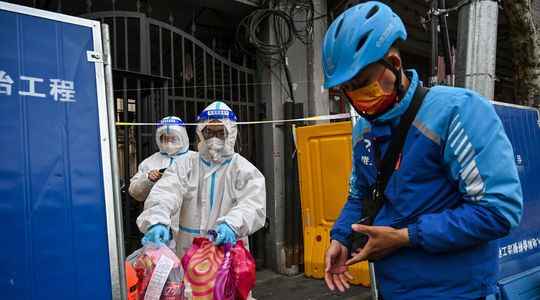Since this evening of April 4, Mathieu Laurent has been living in anguish: “They landed in a full suit in the middle of the night, banging on the door. I had tested positive for Covid the same morning, testifies this French expatriate. Fortunately, my 7 month pregnant wife and 2 year old daughter are not sick, but I fear they will come back and separate us.” For the moment he lives locked in one of the rooms of his apartment communicating only through the door with his wife and daughter, but at any moment the men in white can take him to one quarantine centers built in haste, like the exhibition center transformed into a gigantic dormitory with 40,000 beds.
With more than 20,000 daily cases, despite the confinement of the 26 million inhabitants, the contamination figures continue to increase. “Yet 95% of cases are asymptomatic, notes a French doctor working in a private hospital in the city. There is no reason to isolate them in centers, they should be able to stay at home because they do not need treatment.”
Extreme methods
But the Chinese authorities do not hear it that way and use extreme methods, such as the separation of families. Measures that are not unanimous, far from it. On April 2, a video taken in a public hospital and published on the social network Weibo, showed dozens of children lined up in beds with iron bars, crying, many of them newborns. The video has been viewed over 100 million times, sparking outrage. For its part, the Consulate of France, speaking on behalf of the European Union, asked in a letter to the local authorities “that parents and children are never separated, whatever the situation.
Faced with the outcry, the authorities say they consent to exceptions for very young children with “special needs”. Not enough to reassure families, especially as another problem is looming: the lack of food. To get supplies, Shanghainese have to connect to e-commerce applications, but the sites are taken by storm as soon as they go into service every morning at 6 a.m. and there are not enough delivery people. “I get up every day at 5:30 a.m. to do my shopping, but the site ‘crashes’ and I’ve never been able to order anything,” worries a British expatriate whose stock of food is melting. Some neighborhoods organize vegetable distributions, but very randomly.
Residents in rage
While the authorities claim to be doing their best, videos show angry residents destroying the fences that close off the neighborhoods to demand food. As a result, the authorities deployed the army. And, like in a sci-fi movie, robots patrol the deserted streets, while drones zigzag between the towers of buildings : “Dear inhabitants, warns one of them, please respect the restrictions during confinement, control your desire for freedom and do not sing at your window, because it risks infecting others”.
And woe to the sick of something other than Covid who need medical treatment! Hospitals are closed, even in emergencies, and one must present a test within 48 hours to have a chance of entering them. On Wednesday March 30, a Chinese nurse died of an asthma attack after being refused entry to the hospital where she worked.
Premium for truckers
With the confinement of Shanghai, the whole Chinese economy is faltering. Asia’s second largest financial center behind Tokyo, the city is home to the world’s largest cargo port and serves as a crossroads for global trade. The giant factory of electric car manufacturer Tesla is shut down, like all industries in the region. Truck drivers are asking for a bonus of 300 euros per trip to enter Shanghai, for fear of being confined there, effectively blocking all the connections that lead to the city and its strategic port.
According to some estimates, economic activity in Shanghai has fallen by 40% since March 28. The same policy has long been applied to Hong Kong, but without any success, prompting the city to relax its strategy by partially reopening the borders (except with mainland China), in particular with France since April 1.
Recluse in his apartment, Mathieu Laurent hopes for a similar measure. “We can’t take it anymore! As soon as possible, we’re leaving China,” he assures us. Like the 7,000 French people in Shanghai, this expatriate says he is more frightened by these measures than by the disease itself. Under these conditions, it was impossible to vote on Sunday for the presidential election, the Consulate not having been authorized to open polling stations. 7,000 more abstainers, but forced…
